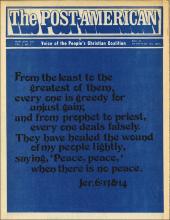In his televised announcement of the Peace agreement, President Nixon stated that the U.S. would continue to consider General Thieu’s administration as “the sole legitimate government of South Vietnam,” and will continue to supply, arm and finance it. Unfortunately, the historical record indicates that Pres. Nixon’s statement means that the U .S. will attempt to maintain in power a government which has no popular support in South Vietnam. This government therefore must rule through assassination, censorship, and jailings. Its survival depends totally on U .S. aid. There is absolutely nothing in its past that indicates that the Saigon government can survive free political competition—and no indication that its U.S. sponsors intend to allow General Thieu and his colleagues to be swept from power. Too strong a series of statements? Let’s look at exactly who our “ally” is.
OVER 200,000 IN JAIL
In October, 1971, while President Thieu was staging what even the U.S. government termed a one-man presidential election, the man who had run second to Thieu in the 1967 elections, Truong Dinh Dzu, was still in jail. According to a deputy in the South Vietnamese government’s Lower House, Hoang The Phiet, over 40,000 South Vietnamese were jailed in that month of October for their opposition to the lack of choice in the elections (reported in the largest Catholic daily newspaper in Saigon, Tin Sang, on February 2, 1972).
Read the Full Article
To continue reading this article — and get full access to all our magazine content — subscribe now for as little as $4.95. Your subscription helps sustain our nonprofit journalism and allows us to pay authors for their terrific work! Thank you for your support.
Already a subscriber?
Login

